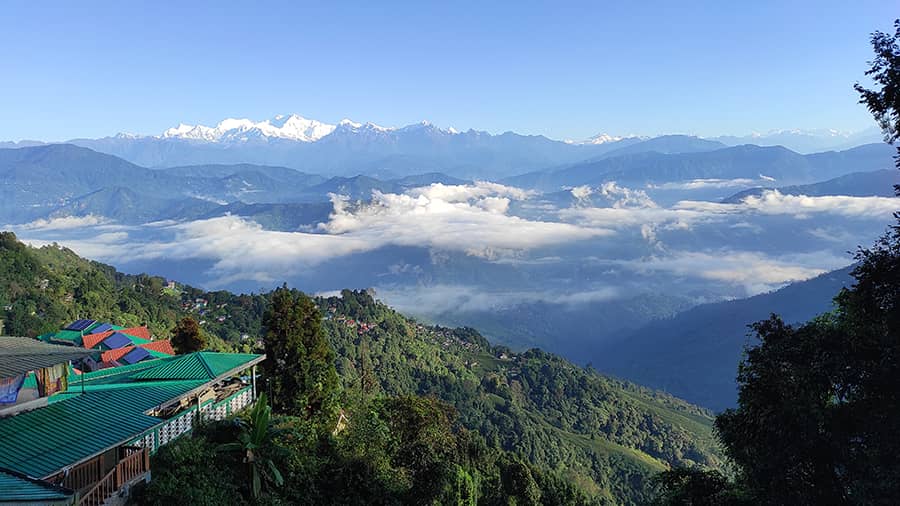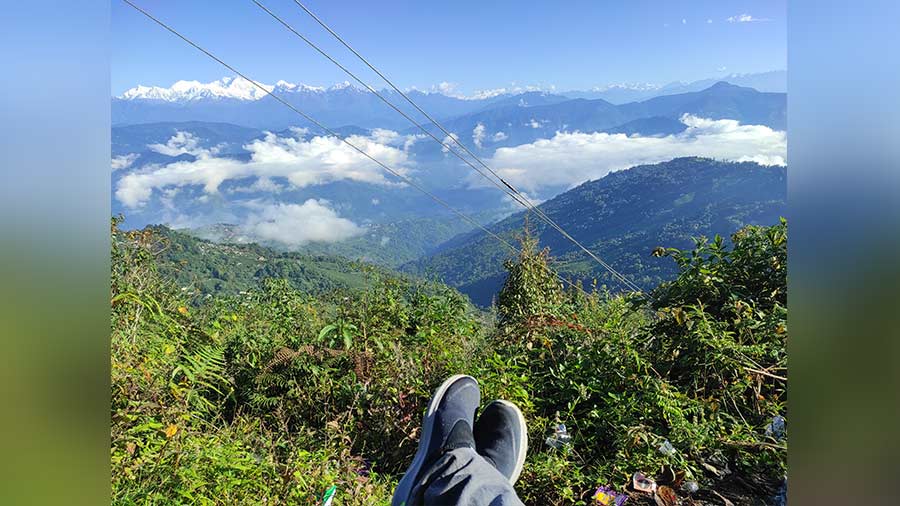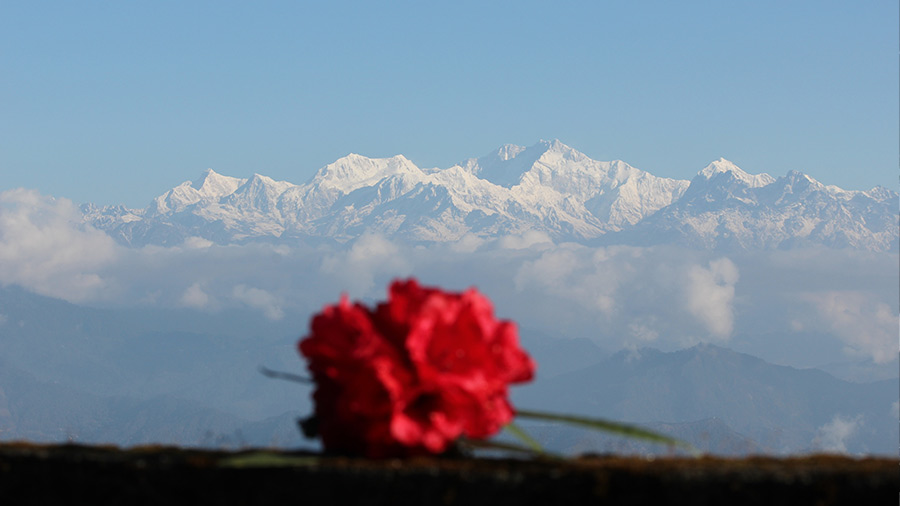(Continued)
“You lucked out! Yesterday, there was a bear spotted on that road!” Sumit revealed with a wicked smile. We were at the homestay Parimal sir had booked for his family, spending our last evening in the hills with home-cooked meals and a few bottles of chhang. Sumit was Sir’s ex-student. And the meal in question, a local dish and an old favourite of Sir’s, came from his home. A young man with curious and somewhat longing eyes, Sumit had the soul of a traveller and was regaling us with stories of the mountains for the last hour or so. The Himalayas, it seemed, retained not just water but stories too, stories of wonder and awe, held beneath the winter ice and between cracks on stone. Sumit had a knack of gathering them in his travels.
Since the homestay was hosting only Sir and his family, all of us had commandeered the living room for the guests. Sumit was on a sofa between Subhendu-da and my friend. Sir and Sarbani-di had taken up the other one on its right and Indrani ma’am was lounging on a divan opposite them. A slight chill in the air had made me bring out my cotton shawl and I was ensconced on an armchair with my legs folded and my luggage packed. I had spent the afternoon alone, trying to work on the third chapter of my dissertation while everyone else had gone out again. I hadn’t written anything but I did notice that the prospect of writing felt less intense today.
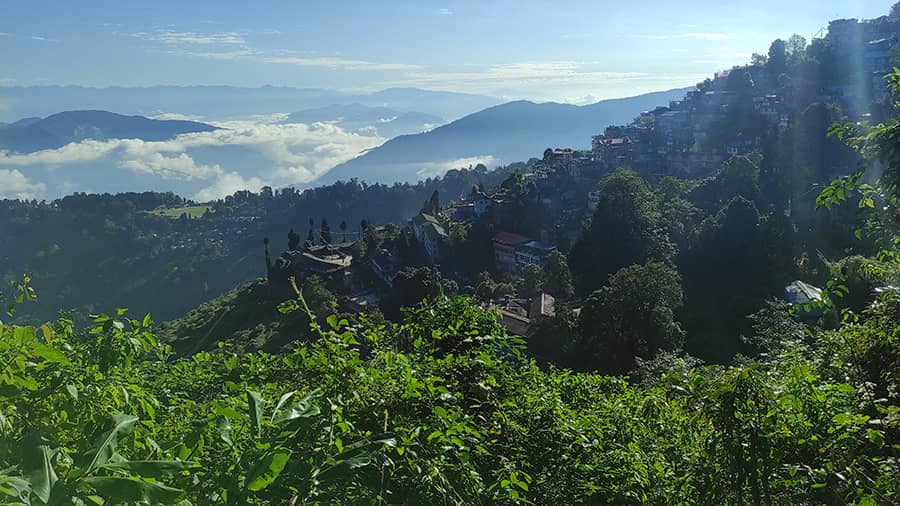
The green valley Sagnik Yadaw
Cooped up in my house on the plains, I had forgotten that the world is not flat and there is no edge for me to fall down from. The hills were high and steep but there would always be ground beneath it. As I took one more sip of the chhang in my glass, I felt a sense of thrill at the possibility of being so close to a bear. On the return journey, our four-legged guide had indeed barked at something unseen for a whole minute. What would have happened if we had had such an encounter?
“Does the playing dead trick actually work?” my friend asked Sumit, echoing my thoughts exactly. “Not on the Himalayan black bears, as far as i know.” “But… but we saw that man with the dog who said he crosses the trail everyday,” it was Sarbani-di now. She too, it seemed, was struggling with the idea. “If you live so close to the woods, you cannot be afraid of your neighbours,” Sumit replied.
The Himalayan black bears are part of the Asiatic black bear family and are among the native inhabitants of Darjeeling. Considered vulnerable and put in the IUCN red list, they are hunted for their paws, skin, head and, most of all, their gallbladder, which stores the bile coveted by us for treating gallstones, liver disease and other illnesses. I remember reading an article during the pandemic that the Chinese government had prescribed injections of bear bile to treat severe Covid cases, a treatment that depended on the bear-bile farms of China, Vietnam and other Asian countries.
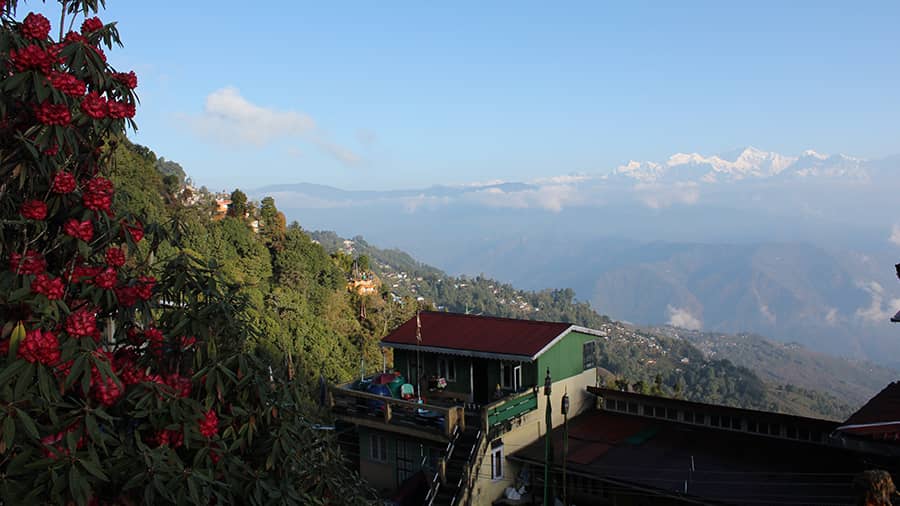
A rhododendron tree with Kanchenjunga in the background Sumit Roy
“They are much less territorial than their North American cousins,” Parimal sir was assuring us, “so they are not likely to attack you because you have trespassed on their land.” “Is that trail part of their land though?” Subhendu-da wondered. “It’s at the border, I guess, between our land and theirs. But the border is closing in on them more and more each decade. You saw those tiled houses and those cottages around the Ropeway Station? When I first came here in the 1990s, there wasn’t a single house on that whole stretch. Roy Villa was considered haunted because it was in the middle of nowhere. Give it another decade and more entitled tourists, there will be shops and food stalls on that road.”
An awkward and guilty pause filled the room after that. Sumit finally broke it by changing the subject to Kanchenjunga. “How did you find the view?” he asked me, knowing this to be my first visit. “You are lucky by the way, the clouds are usually rather protective of the mountains. But Puja and post-Puja is a good time for a visit. The sky is clear and the air doesn’t have its bite yet.” “It’s autumn,” Subhendu-da said from beside him, “everything is clear in autumn, clear and perfect.” I pondered on the last remark as the pearly white fermented drink made its way down my throat with a sense of ease that only maturity can bestow. Ripeness is all, I thought.
It was past 6 when I opened my eyes the next morning. The window curtains had been drawn open and sunlight rested at the foot of my bed. “Good morning, sleepy head,” I heard my friend from the other bed. “I was waiting for you to wake up.” He was all ready, sitting on the side of his bed and grinning like a thief. “Rejoice all for the curse has been lifted! Sore labour's bath, balm of hurt minds, great nature’s second course is on the menu again.” “It’s a bit early for Shakespeare,” I retorted. “Nonsense. Get ready. We have to thank the mountains for giving you a goodnight’s sleep.”
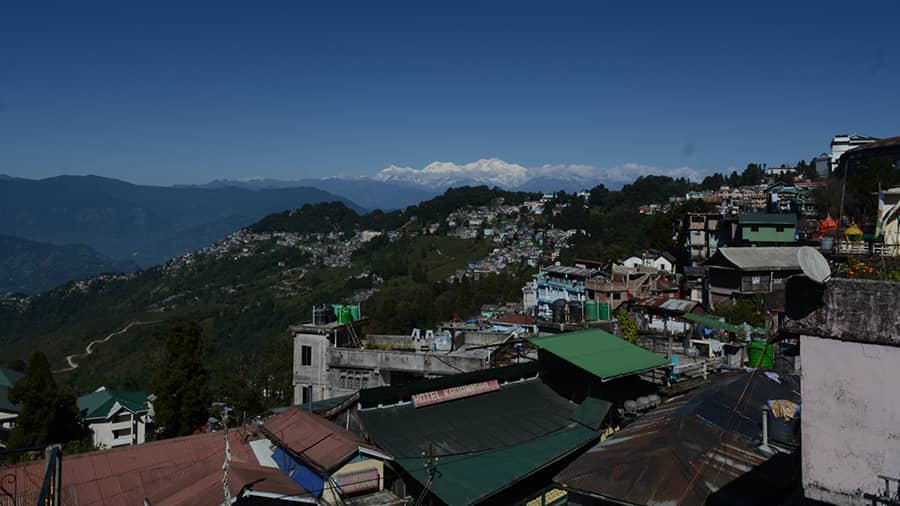
The spread of Darjeeling town Sumit Roy
Unwillingly I got up and stretched my arms. They felt lighter and I noticed that I wasn’t even a little hungover. “How do you know it was the mountain and not the chhang?” I teased him all the same while getting dressed. He looked scandalised and then shook his head in mock-disappointment. “There will always be more things in these hills Sagnik-da than what can be found in a bottle.” I did not say anything but hugged him before we left. I couldn’t remember the last time I had slept so long or had woken up without feeling something heavy on my chest.
We met Sir, Ma’am, and Dharma-daju at the spot where we had sat together yesterday. “How are you feeling?” Ma’am asked. “Fresh out of the ground,” I said, petting the dog’s head while he tried to lick my arm. “Sagnik-da slept all through the night,” my friend looked pleased with himself. “Well, it was his first time having chhang,” Sir smiled indulgently. “That is one potent drink”. “First time on the hills as well and first time seeing a mountain,” my friend was adamant in his belief. Sir nodded and laughed, “Equally intoxicating, yes,” I had already sat down again with Daju and found Sir to be half-right. The view in front of me was addictive. It was hard not to look. But it didn’t numb the world one bit. It made things clear. The hills had given me a slice of autumn to keep.
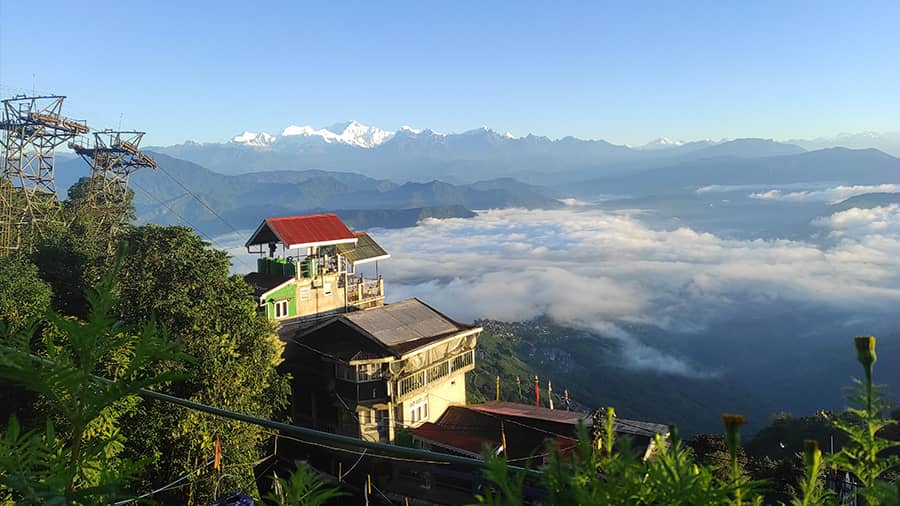
The ropeway station Sagnik Yadaw
Sarbani-di called Sir after a while. The flight was in the afternoon and we would have to clear the bills with our hosts before checking out. They went down to the homestay, followed by my friend, who was yet to pack. I promised him to come down soon and help but I really didn’t want to leave until I had to. Despite the sun on my skin, this was a magical place. I looked at my new friend beside me who didn’t have to say goodbye to the hills. Then again, he didn’t seem that interested in Kanchenjunga and was focussed on smelling a leaf. I wondered what it would be like to be able to smell all these shades of green as I scratched the back of his ear.
In his book, Sir talks about the smell of Darjeeling again and again, from the smell of walnut cake and smoke burning from juniper wood in his grandfather's memories to the odour of dried fish, burnt diesel and urine that suffused the air near the police checkpoint below Keventer’s in his own time. Just like the landscape, there was a soundscape and an odourscape of Darjeeling, of Kolkata and even of that white peak I can see in the distance. The clouds had risen a little from where they were when I had sat down. Soon, they would hide the mountains and reveal to me the valleys beneath. The sky had been dark when we had left Kolkata the day before yesterday. I wondered how far clouds can travel in autumn. Has any of these gentle pools of water ever flown above my roof at home? If the North Wind could ever sneak past the Himalayas, how long will it take for a cloud of Darjeeling to come to Kolkata? I reminded myself to have the windows open during the return trip to the airport. On the way, a cloud might sneak in again.
